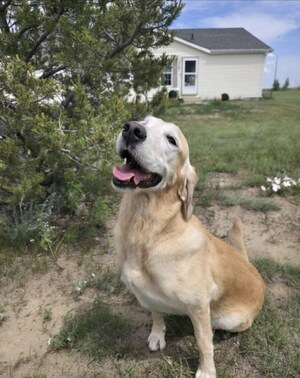
A Popular Summertime Seasoning Quickly Becomes a Potentially Deadly Threat
MINNEAPOLIS, July 20, 2022 /PRNewswire/ -- It's summer. Time to fire up the barbeque, throw on your favorite meats or vegetables, and demonstrate your culinary skills with your secret blend of spices. It turns out that one of those popular summertime seasonings, onion powder, can also be an extremely dangerous but tempting treat to your pet.
"A Costco-sized container of onion powder was accidentally left on the kitchen counter," explained Sharron Champagne of Hooksett, NH. Although both of her family's dogs, Tsuk and Scotty, were left alone with the onion powder, only Tsuk decided to dive in. According to Champagne, "Scotty is smarter than that."
"Tsuk is notorious for stealing things off the counter," said Champagne. "She's extremely focused on food and is always hungry. I swear she can hear a piece of lettuce drop from across the house. Apparently, Tsuk pulled the onion powder container off the counter and ripped it open. The container was about three-quarters full, and what she didn't eat she left on her mat.
At first, we weren't too concerned since she gets into so many things, and we didn't know that ingesting onions is so dangerous to pets. After a few days she became lethargic, stopped eating, started drinking more water than usual and her urine was dark in color. She also started vomiting. That is when we realized something was seriously wrong."
The Champagne family called the toxicology experts at Pet Poison Helpline, who advised them to take Tsuk to the veterinary hospital after discussing the dog's signs.
"The amount of onion powder potentially ingested by Tsuk posed a risk for red blood cell damage, anemia and GI irritation," said Dr. Renee Schmid, a senior veterinary toxicologist at Pet Poison Helpline. "Main clinical signs are often seen within three to five days after ingestion, so the timing of her clinical signs was consistent with onion exposure."
Tsuk was taken to the VCA Capital Area Veterinary Emergency and Specialty, and their medical team followed up with Pet Poison Helpline for treatment recommendations. Once a case has been opened by a pet owner or a veterinary professional, all follow-up consultations are included. They were advised to perform bloodwork, which confirmed Tsuk's red blood cell count was extremely low and Tsuk needed a life-saving blood transfusion. Significant anemia can be detrimental as oxygen transport to tissues and organs throughout the body is compromised, potentially leading to severe, life-threatening damage. Blood transfusions in animals require intense monitoring and care to ensure dangerous reactions don't occur. They also placed her on IV fluids and provided her additional supportive care including monitoring her oxygen levels and administering antioxidants.
"After three days in emergency care, and thousands of dollars in veterinary bills to save her life, Tsuk is now doing great. We are so happy we made the decision to treat her," added Champagne. "Unfortunately, she still hasn't learned her lesson. A couple of weeks after she recuperated from the onion powder, I brought home tulips and left them in the plastic wrapper on the counter. When I came back a few minutes later, she had ripped into them. Apparently, anything in plastic must be freed. We now have a very small bottle of onion powder, and when the garlic powder runs out, we're downsizing that bottle too." Garlic powder has the same toxin and signs as onion powder but has a narrower margin of safety.
"Fortunately, the Champagne family was able to professionally treat Tsuk for her accidental poisoning, but many families are not financially prepared to handle a similar situation," said Dr. Schmid. "Our recommendation to all pet lovers is to consider pet health insurance before something critical and expensive can happen. There have been amazing advances in veterinary medicine, but many of those treatments come at increased cost. We want pet owners to make the best medical decisions for their pets based on their veterinarian's recommendations, not finances. That is why we are proud to partner with Nationwide, which has been protecting pets longer than any other pet health insurance provider in the United States. In fact, all Nationwide pet insurance policies come with 24/7 access to our veterinary professionals included."
Pet Poison Helpline created Toxin Tails to educate the veterinary community and pet lovers on the many types of poisoning dangers facing pets, both in and out of the home. All the pets highlighted in Toxin Tails have been successfully treated for the poisoning and fully recovered.
Pet Poison Helpline, your trusted source for toxicology and pet health advice in times of potential emergency, is available 24 hours, seven days a week for pet owners and veterinary professionals who require assistance treating a potentially poisoned pet. We are an independent, nationally recognized animal poison control center triple licensed by the Boards of Veterinary Medicine, Medicine and Pharmacy providing unmatched professional leadership and expertise. Our veterinarians and board-certified toxicologists provide treatment advice for poisoning cases of all species, including dogs, cats, birds, small mammals, large animals and exotic species. As the most cost-effective option for animal poison control care, Pet Poison Helpline's fee of $75 per incident includes follow-up consultations for the duration of the case. Based in Minneapolis, Pet Poison Helpline is available in North America by calling 800-213-6680. Additional information can be found online at www.petpoisonhelpline.com.
Contact: Dr. Renee Schmid
Pet Poison Helpline
(952) 806-3803
[email protected]
SOURCE Pet Poison Helpline








Share this article